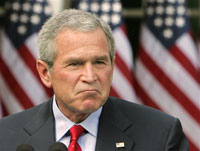Bush to Putin: 'Vladimir, you shouldn't fear a missile defense system'
Russia is not an enemy of the United States and shouldn't fear a proposed missile defense system designed to thwart a possible nuclear attack from Iran, U.S. President George W. Bush said Tuesday.

"Russia is not the enemy," Bush said after meeting with Czech leaders in a visit en route to the G-8 summit in Germany. He said he would take a message to Russian President Vladimir Putin that "we can work together on common threats."
The Kremlin is bitterly opposed to the missile shield, and Putin has warned that Russia could take "retaliatory steps" if Washington insists on building it.
Polls show more than 60 percent of Czechs are against plans to station a radar system southwest of Prague, and surveys in Poland - where 10 interceptor missiles would be based - show strong opposition there as well. Both countries are still negotiating with the U.S. over whether to host the shield.
Bush sought to play down Russia's response, which has overshadowed his European trip.
"The Cold War is over. It ended," Bush said at the medieval Prague Castle, where he met with Czech President Vaclav Klaus and Prime Minister Mirek Topolanek.
"My message will be: 'Vladimir - I call him Vladimir - you shouldn't fear a missile defense system. As a matter of fact, why don't you cooperate with us on a missile defense system?"' Bush said.
"The people of the Czech Republic don't have to choose between being a friend of Russia or a friend of the United States. You can be both," he added.
U.S. experts contend the shield poses no threat to Russia because the missiles involved would be purely defensive and incapable of being fitted with warheads.
Bush said the system would be coordinated with NATO. He said he would urge Putin to participate. "Please send your generals over to see how such a system would work. Send your scientists," Bush said.
Later Tuesday, Bush was to deliver a speech to an international conference on democracy and security at the ornate hilltop Czernin Palace before heading to Germany for the summit.
Klaus said he had frank and open discussions with Bush on the radar system, which would be placed inside the sprawling Brdy military zone southwest of Prague, "and we understand each other."
"We are aware that the U.S. bears high responsibility for the situation in the world, and I would like to stress that the United States and President Bush have our support in that," said Klaus, whose country has deployed troops to the U.S.-led campaigns in Iraq and Afghanistan.
Topolanek has endorsed the shield, and Klaus has said he is open to the concept. Even former President Vaclav Havel, who led the Velvet Revolution that toppled communism in the former Czechoslovakia in 1989, has waded into the fray by publicly ridiculing Russia's objections.
But many ordinary Czechs worry that it could make them terrorist targets.
On Monday, several hundred people demonstrated near the castle, chanting "Shame on Bush!," carrying cardboard rockets and waving banners that read: "Bush: World Hate Tour 2007." No protests were planned for Tuesday.
U.S. officials argue that the missile shield would protect both the United States and Europe from a rocket attack by Iran if the Islamic republic gains nuclear weapons capability. Tehran says its nuclear program is purely peaceful; the U.S. contends it is covertly trying to build a bomb.
Russia, however, is deeply distrustful of any U.S. missiles in Europe - particularly in nations such as the Czech Republic and Poland, both of which were in the Soviet orbit during the Cold War.
Putin said his government would consider aiming nuclear weapons at U.S. military bases in Europe if Washington goes ahead with the shield.
On Tuesday, China also criticized the U.S. plan, saying the anti-missile system could set off an arms race. Chinese Foreign Ministry spokeswoman Jiang Yu said the proposal "is not conducive to mutual trust of major nations and regional security."
Paula DeSutter, the U.S. assistant secretary for verification, compliance and implementation, said Tuesday the U.S. wants to work closely with Russia on arms control in places such as North Korea. But she expressed incomprehension over Moscow's bellicose response to the Eastern Europe shield.
"It's hard to take their rhetoric as anything other than bullying. But on the other hand, when somebody acts like a bully, it is usually because they are frightened of something and we don't want it to be like that," DeSutter said in Brussels, Belgium.
In Prague, Bush also said he was working with the U.S. Congress to ease visa restrictions for Czechs.
The European Union is pressing for visa-free travel for all 27 of its member states, including the Czech Republic, which joined the bloc in 2004.
After the G-8 summit, Bush plans brief stops in Poland, Italy, Albania and Bulgaria.
Subscribe to Pravda.Ru Telegram channel, Facebook, RSS!


